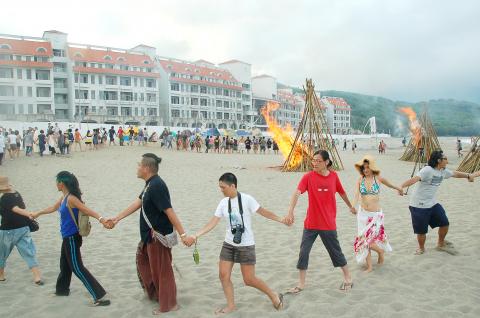After a month of continuous protests through art performances, activists and Amis Aborigines at Shanyuan Bay (杉原灣), Taitung County, who oppose the construction of a beachfront Meiliwan Resort Hotel gathered by the thousands again yesterday for a ritual ceremony at the beach.
The “besiege and fence” project by artists and activists to protest against the build-operate--transfer project was launched on June 10, followed by sit-ins and performances during the following month.
The Taitung County Government is suspected of illegally segmenting the land to avoid the need for an environmental impact assessment. After being sued by local residents and with a court ruling last year ordering a halt to construction, the county government -nevertheless authorized construction and issued licenses to the developer.

Photo: Chang Tsun-wei, Taipei Times
Construction was continuing as of press time.
About 20 environmental groups, community development organizations and civic groups gathered at the beach yesterday for a large-scale protest called “Thousands of people hold hands hohaiyan.”
Hohaiyan, a term often used in Aborigine folk songs, sounds like “shout to the ocean” in Mandarin, said Mayaw Biho (馬躍比吼), one of Taiwan’s most prolific Aboriginal documentary filmmakers. “That’s why we use it to symbolize our goal of protecting the ocean.”
The half-day protest began in the afternoon with elderly Amis, who led participants in a ritual prayer for blessings. The elders said they had lived in harmony with the ocean for generations and could not understand why the area was now being sold to private corporations.
Hand in hand, the protesters shouted that the resort hotel should be torn down and that construction that intrudes on Aborigine land rights and ignores the oceanic ecology must cease immediately.
Later on, the groups started a ritual symbolizing firing opposition toward the resort hotel.
“We want the government to know that while you are celebrating the Republic of China centenary, we are facing a bloody and tearful centenary,” Mayaw Biho said, adding that Aborigines had shared fish and the ocean with each other for centuries and would not yield the ocean to corporations.
Aborigines in eastern Taiwan are becoming increasingly deprived of their land rights, which is reminiscent of what happened to tribes in western parts of the country in the past century as economic development led to a boom in construction, Mayaw Bih said.
Continuing into the night, more than 20 groups and bands performed at the beach, including Aboriginal folk singer Panai (巴奈) and Takanow (達卡鬧), a singer of Rukai (魯凱族) and Paiwan (排灣族) ancestry.
Earlier on Friday, artists and cultural workers held a press conference to protest against what they termed inappropriate development and procedural injustice by the government benefiting corporations at the expense of residents.
“Developing tourism doesn’t mean you must exploit the land. You must get to know the local culture in depth and respect local Aborigines. Then you can decide what to do,” said a tearful Takanow, a resident near Sansiantai (三仙台), which is also threatened by construction.
“I came to Taiwan 15 years ago and I love Taiwan. However, do you think I like Taiwan because there are huge resort hotels everywhere? No. I love Taiwan because of the unique natural environment and unique Aboriginal cultures,” musician and environmental activist Matthew Lien said.

A preclearance service to facilitate entry for people traveling to select airports in Japan would be available from Thursday next week to Feb. 25 at Taiwan Taoyuan International Airport, Taoyuan International Airport Corp (TIAC) said on Tuesday. The service was first made available to Taiwanese travelers throughout the winter vacation of 2024 and during the Lunar New Year holiday. In addition to flights to the Japanese cities of Hakodate, Asahikawa, Akita, Sendai, Niigata, Okayama, Takamatsu, Kumamoto and Kagoshima, the service would be available to travelers to Kobe and Oita. The service can be accessed by passengers of 15 flight routes operated by

Alain Robert, known as the "French Spider-Man," praised Alex Honnold as exceptionally well-prepared after the US climber completed a free solo ascent of Taipei 101 yesterday. Robert said Honnold's ascent of the 508m-tall skyscraper in just more than one-and-a-half hours without using safety ropes or equipment was a remarkable achievement. "This is my life," he said in an interview conducted in French, adding that he liked the feeling of being "on the edge of danger." The 63-year-old Frenchman climbed Taipei 101 using ropes in December 2004, taking about four hours to reach the top. On a one-to-10 scale of difficulty, Robert said Taipei 101

MORE FALL: An investigation into one of Xi’s key cronies, part of a broader ‘anti-corruption’ drive, indicates that he might have a deep distrust in the military, an expert said China’s latest military purge underscores systemic risks in its shift from collective leadership to sole rule under Chinese President Xi Jinping (習近平), and could disrupt its chain of command and military capabilities, a national security official said yesterday. If decisionmaking within the Chinese Communist Party has become “irrational” under one-man rule, the Taiwan Strait and the regional situation must be approached with extreme caution, given unforeseen risks, they added. The anonymous official made the remarks as China’s Central Military Commission Vice Chairman Zhang Youxia (張又俠) and Joint Staff Department Chief of Staff Liu Zhenli (劉振立) were reportedly being investigated for suspected “serious

Taiwanese and US defense groups are collaborating to introduce deployable, semi-autonomous manufacturing systems for drones and components in a boost to the nation’s supply chain resilience. Taiwan’s G-Tech Optroelectronics Corp subsidiary GTOC and the US’ Aerkomm Inc on Friday announced an agreement with fellow US-based Firestorm Lab to adopt the latter’s xCell, a technology featuring 3D printers fitted in 6.1m container units. The systems enable aerial platforms and parts to be produced in high volumes from dispersed nodes capable of rapid redeployment, to minimize the risk of enemy strikes and to meet field requirements, they said. Firestorm chief technology officer Ian Muceus said